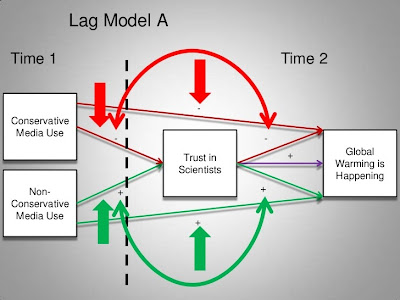One way to cast doubt on global warming
is by questioning the credibility of scientists. In Merchants of
Doubt, Naomi Oreskes and Erik Conway review how industry-funded scientists have been running
effective media campaigns to mislead the public about scientific
research for five decades. Some of the same organizations that claim
global warming is unproven developed this strategy to deny the truth
of studies linking smoking to lung cancer. Here is Dr. Oreskes
discussing her research.
A new paper by Jay Hmielowski and others, in the journal Public Understanding of Science,
examines the familiar hypothesis that conservative media promote doubts about climate change, but demonstrates it more convincingly
than in the past. Their argument states:
- Use of conservative media—in this case, Fox News and The Rush Limbaugh Show—is associated with a lack of belief that climate change is happening. Exposure to non-conservative media—ABC, CBS, NBC, NPR and MSNBC—is associated with greater belief in climate change.
- Exposure to these same conservative media is also correlated with a lack of trust in scientists; while exposure to non-conservative media is correlated with greater trust in scientists.
- Conservative media exposure causes distrust of scientists, which in turn causes climate change skepticism; while nonconservative media exposure causes trust in scientists, which causes belief in climate change. Another way of saying this is that the relationship between media exposure and belief in climate change is mediated by trust in scientists.
Previous research has shown that conservative media use is associated with lack of
belief in global warming. However, correlation does not mean
causation. It is impossible to say, for example, whether viewers are
being influenced by Fox News or whether people who have already
rejected global warming are attracted news media that reflect their
views. However, the direction of causality can be clarified by
collecting data at two points in time.
Hmielowski's data come from a panel study—a survey in which the same people are
interviewed more than once—collected by Knowledge Networks. Their
sample is representative of the American adult population. A group
of 1036 people responded in the Fall of 2008 and again in the Spring
of 2011 to questions about how often they watched conservative and
non-conservative media, their trust in scientists, and their
certainty that global warming was happening. To eliminate
alternative explanations, several variables were statistically
eliminated from the data: local media use, political ideology,
religiosity, gender, race, age, education and income.
The hypotheses were evaluated using structural equation modeling, a
statistical analysis that tests whether the correlations along a
proposed path account for a significant percentage of variation in
the outcome, belief in climate change. On the basis of this
analysis, they found that conservative media use in 2008 is
associated with a change
toward mistrust of scientists in 2001 which is associated with a
change toward lack of
belief in global warming in 2011. There was also a similar path from
nonconservative media use in 2008 to increased trust in scientists in
2011 to increased belief in global warming in 2011. Their results
are shown in the diagram, with the pluses and minuses indicating
where positive and negative relationships were obtained.
Although
these are still correlational data, the 2½
year time lag increases our confidence that it is media exposure that
influences beliefs rather than vice versa.
However, since the participants themselves decided which newscasts
to watch, the study does not control for self-selection
bias. It is possible that the
conservative viewers were exposed to other influences over these 2½
years to which the nonconservative viewers were not. We also can't
be sure that the nonconservative media viewers, had they watched Fox
News and Rush Limbaugh, would have been equally persuaded to mistrust
scientists and reject global warming, or that the conservative media
viewers would have had different beliefs if they had only watched the
mainstream media.
It's also worth
noting that distrust of science among conservatives predates Fox
News, which began in 1996. Sociologist Gordon Gauchat compared survey data measuring trust in science among conservatives, moderates
and liberals from 1974 to 2010. Conservatives actually began the
period with slightly greater confidence in science, but showed a
significant decline, while liberals and moderates did not. Those who
report attending church frequently also became significantly more
distrusting of science. Obviously, there is considerable overlap
between the two groups. The greatest declines in trust among conservatives occurred during the Reagan and George W.
Bush presidencies. Chris Mooney has suggested that mistrust began when scientists questioned the
effectiveness of Reagan's missile defense shield (the “Star Wars”
program).
You may also be interested in reading:
Reality Shows a Slight Gain
Two Different Worlds
You may also be interested in reading:
Reality Shows a Slight Gain
Two Different Worlds

No comments:
Post a Comment
Comments are always welcome.